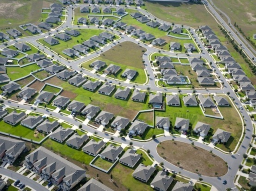 'American governments continue to be obsessed with maximizing people’s capacity to travel, even as they ignore minimizing the amount people have to travel. Not only must American families pay the taxes to support this continually-expanding system, but to live in it they are required to purchase, maintain, and store a fleet of vehicles even as they endure heightened sensitivity to oil price fluctuations (and support the military adventures that result).
'American governments continue to be obsessed with maximizing people’s capacity to travel, even as they ignore minimizing the amount people have to travel. Not only must American families pay the taxes to support this continually-expanding system, but to live in it they are required to purchase, maintain, and store a fleet of vehicles even as they endure heightened sensitivity to oil price fluctuations (and support the military adventures that result).
Like Medicare, Social Security, and a myriad of other federal initiatives, housing and transportation subsidy programs are as popular today as they are financially insolvent. In an effort to prop up our suburban experiment, we now have the Federal Reserve owning the mortgage-backed securities market while Republicans in Congress champion “pension smoothing” as a way to pretend an insolvent federal highway trust fund can continue to build more roads. As with any over-centralized effort, a lack of appropriate feedback mechanisms allows the system to continue barreling down its present course–until it buckles under its own insolvency. Our suburban experiment has an expiration date.
The sad reality is that, despite the marketing, the suburbs were never about creating household wealth; they were about creating growth on the cheap. They were born under a Keynesian regime that counted growth from government spending as equivalent to that coming from private investment. Aggressive horizontal expansion of our cities allowed us to consistently hit federal GDP and unemployment targets with little sophistication and few difficult choices.
That we were pawning off the enormous long-term liabilities for serving and maintaining all of these widely dispersed systems onto local taxpayers–after plying municipalities with all the subsidies, pork spending, and ribbon cuttings needed to make it happen–didn’t seem to enter our collective consciousness. When all those miles of frontage roads, sewer and water pipes, and sidewalks fall into disrepair–as they inevitably will in every suburb–very little of it will be fixed. The wealth necessary to do so just isn’t there.
To quote the late columnist Earl Wilson, “Modern man drives a mortgaged car over a bond-financed highway on credit card gas.” Debt-to-income and debt-to-assets ratios for U.S. households have grown steadily during suburban expansion.'
- Charles Marohn, The Conservative Case Against the Suburbs

